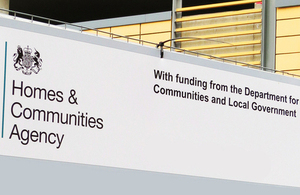Strong year of investment by social housing sector - HCA publishes Global accounts
The 2017 Global accounts of private registered providers has been published alongside unit cost data

The 2017 Global accounts of private registered providers, published today by the Regulator of Social Housing, shows that the sector delivered another strong year of investment in new and existing social housing properties.
Based on analysis of submitted regulatory returns and statements, the annual publication provides an overview of the financial status of private registered providers of social housing who own or manage at least 1,000 homes.
The main findings for 2017 are:
-
The sector invested £10bn in new housing supply (including social housing, as well as investment in properties for sale, and market rent) and £1.6bn in existing stock. Total investment of £11.6bn represents a 15% increase on 2016.
-
Of this, investment in new and existing social housing stock was £7.9bn, including £6.3bn in new rental supply – an increase of £0.7bn on 2016. Investment was funded by past surpluses, debt and grant and resulted in the completion of 41,000 social homes for rent.
-
Turnover was unchanged at £20 billion, as providers have implemented the 1% rent reduction on general needs units (required under the Welfare Reform and Work Act 2016), offset by additional rental income from new properties.
-
Operating margins have increased by 2% to 30%, through reductions in operating expenditure – social housing costs per unit decreased by 7% to £3,698, with reductions in both management and maintenance costs.
-
Total debt held by the sector increased by £2.9bn to £69.6bn.
-
Interest cover was again strong at over 200% excluding one-off breakage costs, servicing existing debt and supporting additional investment
-
The underlying net surplus was £3.5bn – a 7% increase on 2016, with reported net surplus of £4.1 billion. The reported net surplus is increased by the one-off gains reported on mergers of £0.6bn and is not indicative of recurring performance.
Fiona MacGregor, Director of Regulation said:
This year’s figures show that the social housing sector is continuing to invest substantially in existing stock and new supply and as a whole is well-placed to respond to the changing operating environment. The sector has consolidated over recent years and there are now a small number of very large providers; significant changes in these providers can have a material effect on sector results.
The year-on-year decrease in management costs and major repairs expenditure demonstrate how the first 12 months of rent reductions have been managed. While the lower repairs spend partly indicates the progress being made towards reducing non-decent stock we will continue to encourage providers to have a rigorous, evidence-based approach to expenditure and investment, which ensures that housing is sustainable for the long term, responds to tenant needs and gives good value for money.
The 2016 Global Accounts were published in February 2017. In response to sector feedback that an earlier publication date would help providers to compare their performance against their peers more easily, we have brought forward the publication date compared to previous years.
The annual Global Accounts of housing providers are available on the website. The headline social housing unit cost data, based on 2017 submissions, is included in the Global Accounts data file.
Further information
-
This is the second year of the Financial Reporting Council Accounting Standards where the presentation of financial statements has changed in areas such as accounting treatments for government grant, the valuation of housing properties and the measurement of financial instruments. These are presented under the new Financial Reporting Standard 102 and the Housing Statement of Recommend Practice 2014.
-
Under International Financial Reporting Standards most mergers in the sector are accounted for using the purchase accounting method. This requires the receiving organisation to report the fair value of the net assets acquired – effectively the balance sheet – as a gain (or profit) in the year of acquisition. The gain will usually be considerably more than the annual trading surplus generated by the merging organisation, and so will inflate reported surpluses in the year of acquisition. Subsequent years will not be affected.
-
A small number of providers who have risen above the 1,000 unit threshold have been added to the Global Accounts dataset for the first time in 2017.
-
The Homes and Communities Agency is the single, national housing and regeneration delivery agency for England, and is the regulator of social housing providers. As regulator, its purpose is to promote a viable, efficient and well-governed social housing sector able to deliver homes that meet a range of needs. It will do this by undertaking robust economic regulation, as enshrined in legislation, focusing on governance, financial viability and value for money that maintains lender confidence and protects the taxpayer.
For more information visit the HCA website or follow us on Twitter.
Our media enquiries page has contact details for journalists.
For general queries to the HCA, please email mail@homesandcommunities.co.uk or call 0300 1234 500.